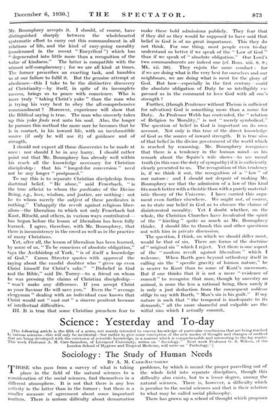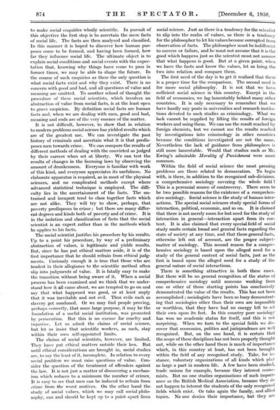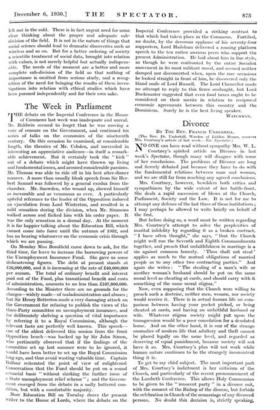Science : Yesterday and To-day
[The following article is the fifth of a series, not mainly intended to convey knowledge of particular conclusions that are being reached In various sciences—this will only be incidental—but rather to give some conception of the new modes of thought and changes of method that are being developed with the extension of scientific knowledge, in a manner which is comprehensible and interesting to the lay reader. This week Professor A. M. Carr-Saunders, of Liverpool University, writes on " Sociology." Next week Professor G. S. Wilson, of tho London School of Hygiene and Tropical Medicine, will write on " Pathology."J
Sociology : The Study of Human Needs
BY A. M. CAUR-SAuNDERS to make social enquiries wholly scientific. In pursuit of this objective the first step is to ascertain the mere facts of social life. The facts are then analysed and classified. In this manner it is hoped to discover how human pur- poses come to be formed, and having been formed, how far they influence social life. The ultimate object is to explain social conditions and social events with the expec- tation that, knowing why things have come to pass in former times, we may be able to shape the future. In the course of such enquiries as these the only question is what social facts exist and why they exist. There is no concern with good and bad, and all questions of value and meaning are omitted. To another school of thought the procedure of these social scientists, which involves an abstraction of value from social facts, is at the least open to grave suspicion. By definition social facts are human facts and, when we are dealing with men, good and bad, meaning and ends are of the very essence of the matter.
It is not difficult, however, to show that in relation to modern problems social science has yielded results which are of the greatest use. We can investigate the past history of criminals and ascertain what it is that predis- poses men towards crime. We can compare the results of different methods of dealing with the convicted as judged by their careers when set at liberty. We can test the results of changes in the licensing laws by observing the amount of drunkenness. Everyone is familiar with work of this kind, and everyone appreciates its usefulness. No elaborate apparatus is required, as in most of the physical sciences, and no complicated methods except where advanced statistical technique is employed. The diffi- culty lies in the ascertainment of the facts. The un- trained and inexpert tend to class together facts which are not alike. They will try to show, perhaps, that poverty predisposes to crime ; but there are many differ- ent degrees and kinds both of poverty and of crime. It is in the isolation and classification of facts that the social scientist is an expert rather than in the methods which he applies to his facts.
The social scientist justifies his procedure by his results. Up to a point his procedure, by way of a preliminary abstraction of values, is legitimate and yields results. But, since he has put ethical matters aside, it is of the first importance that he should refrain from ethical judg- ments. Curiously enough it is true that those who are loudest in their allegiance to the scientific method often slip into judgments of value. It is fatally easy to make the transition without being aware of it. When a social process has been examined and we think that we under- stand how it all came about, we are tempted to go on and say that what happened was good, or at least imply that it was inevitable and not evil. Thus evils such as slavery get condoned. Or we may find people proving, perhaps correctly, that some large purpose, it may be the foundation of a useful social institution, was promoted by persecution. But this is no excuse for cruelty and injustice. Let us admit the claims of social science, but let us insist that scientific workers, as such, stay within their own self-appointed limits.
The claims of social scientists, however, are limited. They have put ethical matters outside their ken. But until ethical considerations are brought in, social studies arc, to say the least of it, incomplete. In relation to every social problem we must raise questions of value. Con- sider the question of the treatment of offenders against the law. It is not just a matter of discovering a mechan- ism which reduces to a minimum the number of crimes. It is easy to see that men can be induced to refrain from crime from the worst motives. On the other hand the study of social values, which we may call social philo- sophy, can and should be kept up to a point apart from social science. Just as there is a tendency for the scientist to slip into the realm of values, so there is a tendency for the philosopher to let his values become corrupted from observation of facts. The philosopher must be indifferent to success or failure, and he must not assume that it is the good which happens just as the scientist must not assume that what happens is good. But at a given point, when we have the facts and know the values, let us bring the two into relation and compare them.
The first need of the day is to get it realised that there is a proper time for the comparison. The second need is for more social philosophy. It is not that we have sufficient social science in this country. Except in the field of economics, we lag lamentably behind many other countries. It is only necessary to remember that we have hardly any posts in universities and research institu- tions devoted to such studies as criminology. What we lack cannot be supplied by lifting the results of foreign workers and using them. We can use the result reached by foreign chemists, but we cannot use the results reached by investigations into criminology in other countries because the conditions investigated are not the same. Nevertheless the lack of guidance from philosophers is still more lamentable. Would that studies such as Mr. Ewing's admirable Morality of Punishment were more common.
Within the field of social science the most pressing problems are those related to demarcation. To begin with, is there, in addition to the recognized sub-divisions, a comprehensive sociology covering the whole field ? This is a perennial source of controversy. There seem to be two possible reasons for the existence of a comprehen- sive sociology. Social science is the study of human inter actions. The special social sciences study special forms of interaction, political, economic, and so on. It is claimed that there is not merely room for but need for the study of interaction in general—interaction apart from its con- tent. It is also claimed that every special field of social study omits certain broad and general facts regarding the state of society at any time, and that these general facts, otherwise left out of account, are the proper subject- matter of sociology. This second reason for a compre- hensive sociology is based upon the alleged need for a study of the general content of social facts, just as the first is based upon the alleged need for a study of the general nature of social interactions.
There is something attractive in both these cases. But there will be no general recognition of the status of comprehensive sociology until someone working from one or other of those starting points has conclusively demonstrated the value of the results. This has not been accomplished ; sociologists have been so busy demonstrat- ing that sociologies other than their own are impossible or worthless, that they have had no energy left to set their own upon its feet. In this country pure sociology has won no academic status for itself, and this is not surprising. When we turn to the special fields we dis- cover that economies, politics and jurisprudence are well recognized. But, on the one hand, it is certain that the scope of these disciplines has not been properly thought out, while on the other hand there is much of importance which, in this country at least, has not been brought within the field of any recognised study. Take, for in- stance, voluntary organizations of all kinds which play so large a part in modern life. A few have been studied, trade unions for example, because they interest econo- mists. But no one studies organisations of such import- ance as the British Medical Association, because they do not happen to interest the students of the only recognized fields which exist. Or take again the family, and allied topics. No one denies their importance, but they are
left out in the cold. There is in fact urgent need for some clear thinking about the proper and adequate sub- division of the field. It is not in the nature of things that social science should lead to dramatic discoveries such as wireless and so on. But for a better ordering of society a scientific treatment of social data, brought into relation with values, is not merely helpful but actually indispens- able. The needs of the moment are a better and more complete sub-division of the field so that nothing of importance is omitted from serious study, and a recog- nition of the need for bringing the results of these inves- tigations into relation with ethical studies which have been pursued independently and for their own sake.




























































 Previous page
Previous page